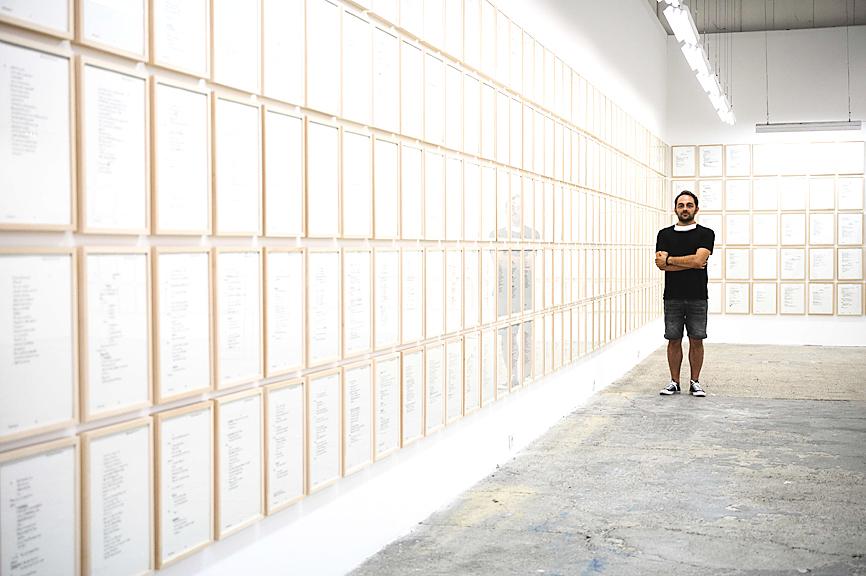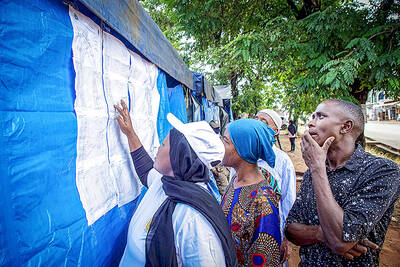For nearly four years Serbian artist Vladimir Miladinovic started his day with a morning coffee and the diary of one of the Balkans’ most notorious war criminals, Ratko Mladic.
Word for word, he painstakingly copied the notebook’s 400 pages by hand onto fresh white sheets, which now cover the walls of a Belgrade exhibition raising questions about how to confront one of the region’s darkest chapters.
For the 39-year-old artist, the task was in part a “performative act of trying to deal with this very harsh material which we are still forced to deal with today, 25 years after the war,” he said from the austere gallery on the banks of the Danube River.

Photo: AFP
His subject, the 77-year-old former Bosnian Serb commander whose troops committed genocide in Srebrenica among other war crimes during Yugoslavia’s collapse, was sentenced to life in prison by an international tribunal in The Hague, the Netherlands, in 2017.
Mladic’s appeal trial is due to start tomorrow. Yet while the legal process moves forward, the wounds he left in former Yugoslavia still fester and his personal legacy remains a battleground.
Many Serbs still consider Mladic a hero and deeply distrust international courts they feel are biased against them.
After his conviction in 2017, Serbian President Aleksandar Vucic called on the country to “start looking to the future.”
However, Miladinovic has gone in the other direction: Finding artistic inspiration through immersing himself in the granular details of his country’s troubled history.
His previous works have involved a similar redrawing of wartime newspaper pages and primary documents that deal with the “problematic parts of the past that are still negotiable in the present.”
Lining the walls of the stark gallery space, the diary entries are easy to read — written in simple, spare language with ink wash — but their sheer number makes them difficult to fully absorb.
Spread out page for page, they make visible the effort needed to face one’s history, individually and collectively through institutions like a court, yet the pages themselves reveal little about the writer.
Drafted in militaristic prose, these are not the crazed scribblings one might expect from a man deemed the “epitome of evil” by a UN rights chief.
Rather, they are a neat log of notes from political and military briefings, with bullet-point lists recording each speaker’s remarks.
“In the end we can say that it’s even banal, banal language that says nothing but at the same time says a lot,” the artist said.
Some entries are purely logistical, for example one that notes the limited supplies of flour and oil for a local bakery.
Another details the precise number of Serbs in various Bosnian towns, eerily bringing to mind the ethnic cleansing that took place as Mladic carved out a Serbs-only statelet in an area once shared with Croats and Muslims.
“We have a state on a platter, we just need to take it,” reads one comment in a conversation with Momcilo Krajisnik, a Bosnian Serb political leader also convicted by the International Criminal Tribunal for the former Yugoslavia (ICTY).
Mladic’s own point of view is hard to find, though in one entry he writes under the words “my contribution” that Bosnia’s Serbs need “unity,” “manpower and officers,” “funds for conducting a war” and “allies.”
Miladinovic’s exhibition, titled The Notebook, is only the latest incarnation of the diary.
Dating from 1992, the start of Bosnia’s war, it was one of some 18 notebooks discovered a decade ago by ICTY investigators behind a fake wall in the Belgrade home of Mladic’s wife.
At the time, the man himself was still on the run and would not be arrested until a year later in Serbia, ending a 16-year manhunt.
Handwritten in Cyrillic, the diaries were transcribed by a team of graphologists into a digitized version. This text was then translated into English and French for the court’s international members.
Miladinovic continued the cycle, using the English text as the basis of his own work.
The exhibition has drawn more attention internationally than at home, which does not surprise him.
“The work itself is trying to do something which is the opposite of what [Serbian] society is trying to do, to forget — to deny, to erase such important issues from the past,” he said.

With much pomp and circumstance, Cairo is today to inaugurate the long-awaited Grand Egyptian Museum (GEM), widely presented as the crowning jewel on authorities’ efforts to overhaul the country’s vital tourism industry. With a panoramic view of the Giza pyramids plateau, the museum houses thousands of artifacts spanning more than 5,000 years of Egyptian antiquity at a whopping cost of more than US$1 billion. More than two decades in the making, the ultra-modern museum anticipates 5 million visitors annually, with never-before-seen relics on display. In the run-up to the grand opening, Egyptian media and official statements have hailed the “historic moment,” describing the

‘CHILD PORNOGRAPHY’: The doll on Shein’s Web site measure about 80cm in height, and it was holding a teddy bear in a photo published by a daily newspaper France’s anti-fraud unit on Saturday said it had reported Asian e-commerce giant Shein (希音) for selling what it described as “sex dolls with a childlike appearance.” The French Directorate General for Competition, Consumer Affairs and Fraud Control (DGCCRF) said in a statement that the “description and categorization” of the items on Shein’s Web site “make it difficult to doubt the child pornography nature of the content.” Shortly after the statement, Shein announced that the dolls in question had been withdrawn from its platform and that it had launched an internal inquiry. On its Web site, Le Parisien daily published a

UNCERTAIN TOLLS: Images on social media showed small protests that escalated, with reports of police shooting live rounds as polling stations were targeted Tanzania yesterday was on lockdown with a communications blackout, a day after elections turned into violent chaos with unconfirmed reports of many dead. Tanzanian President Samia Suluhu Hassan had sought to solidify her position and silence criticism within her party in the virtually uncontested polls, with the main challengers either jailed or disqualified. In the run-up, rights groups condemned a “wave of terror” in the east African nation, which has seen a string of high-profile abductions that ramped up in the final days. A heavy security presence on Wednesday failed to deter hundreds protesting in economic hub Dar es Salaam and elsewhere, some

Flooding in Vietnam has killed at least 10 people this week as the water level of a major river near tourist landmarks reached a 60-year high, authorities said yesterday. Vietnam’s coastal provinces, home to UNESCO world heritage site Hoi An ancient town, have been pummeled by heavy rain since the weekend, with a record of up to 1.7m falling over 24 hours. At least 10 people have been killed, while eight others are missing, the Vietnamese Ministry of Natural Resources and Environment said. More than 128,000 houses in five central provinces have been inundated, with water 3m deep in some areas. People waded through